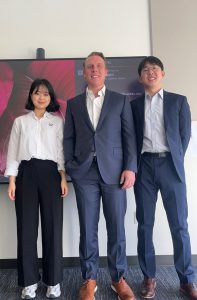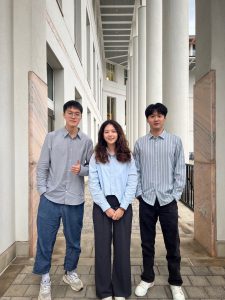Rising to the Challenge: Goizueta Students Excel in Adobe Analytics Competition
In March, students from Goizueta Business School’s MSBA and MBA programs competed in the Adobe Analytics Challenge. This analytics-focused business case competition focuses on leveraging Adobe’s analytics tools and real-world data to uncover insights for major corporations. This year, out of over 2,000 teams from across the globe, not one, but two teams from Goizueta advanced to the semifinals, placing them among the top 20 teams. Here, we sit down with a member from each team, Bradley Ge and Younkyung (Ella) Lee, to learn more about the competition!


Can you tell us a bit about yourselves and your background as students at Goizueta Business School?
- Bradley Ge (BG): My name is Bradley (Zhiyuan) Ge. Before enrolling at Emory, I attended the University of California, Irvine, where I studied Quantitative Economics (Econometrics) and Sociology. Leveraging my understanding of statistics, I decided to pursue my graduate studies in Business Analytics at Goizueta Business School, aiming to bolster my knowledge and skills to get me prepared as a data scientist.
- Younkyung (Ella) Lee (EL): I completed my undergraduate and master’s degrees in Psychology at Yonsei University in South Korea, where I honed my skills in empirical research methods and statistical analysis. Seeking to apply these skills in a fast-paced environment, I enrolled in the Business Analytics program at Goizueta Business School. My goal was to pivot into Data Science, utilizing my analytical expertise to address and solve real-world business problems.
What inspired you to participate in the Adobe Analytics Challenge, and how did you approach the competition?
- BG: Professor Rajiv Garg introduced us to the competition. We believe this worldwide competition will be a great opportunity for us to leverage our understanding of data analytics to solve real-world problems. We believe that our diligent engagement in the courses offered by our MSBA program has laid a robust foundation for our participation. These courses have equipped us with essential business acumen, data processing capabilities, and problem-solving skills, ensuring we are thoroughly prepared for this competition.
- EL: Similar to Bradley’s team, we learned about the competition through Professor Rajiv Garg. The moment we heard about it, we immediately knew we wanted to participate because it was a great chance to work with real data from real companies and test what we learned from both curriculums —a rare opportunity before stepping into the workforce. Ultimately, even with a busy schedule, we took the competition seriously because we wanted to create work that we could be proud of.
Could you share some insights into the experience of competing in the challenge and working with your faculty advisors?
- BG: Given the time-intensive nature of the competition, we faced a significant challenge managing our schedules, particularly when juggling exam preparation, interviews, projects, and meetings simultaneously. Time management emerged as a crucial skill necessary to excel in this competition. Furthermore, it’s essential not to become overconfident about your solutions. Seeking guidance from faculty advisors is invaluable. We are especially grateful to our faculty advisor, Professor Rajiv Garg, whose extensive experience in this field was indispensable. His insightful advice was instrumental to our success, and we believe it played a pivotal role in our achievement.
- EL: The challenge was extremely difficult because of the time limitation and the ambiguity of the data. For instance, even before the day the first deliverable was due, we would get new information from the Adobe team. Sometimes we would work on one path and realize the data was not there and had to course correct very quickly.
However, personally, it was rewarding for me because I got to work with MBA students that I never really get to interact with in the MSBA program. By working together, I believe everyone from both programs learned from each other, whether it was technical data-related concepts or business concepts.
Our faculty advisor, Professor Alvin Lim, played a crucial role in our success. With his extensive background in marketing analytics, he guided us in tackling the complex problems we faced. He emphasized the importance of not just analyzing the data, but also effectively communicating our findings to stakeholders and addressing the critical “so what?” question.
How did you leverage Adobe’s analytics tools and real-world data to uncover insights for major corporations during the competition?
- BG: We utilized Adobe’s analytics tools to dig deeply into the largest automotive company’s customer data, creating visualizations and analyzing trends that reveal insights into consumer behavior and preferences. By integrating these findings with theoretical frameworks, we developed tailored, data-driven strategies to improve customer engagement and optimize marketing efforts. This practical application of Adobe’s tools to real-world data not only strengthened our analytical skills but also underscored the importance of actionable insights in business decision-making.
- EL: Firstly, Adobe’s analytics tools are user-friendly and don’t require extensive coding, allowing us to dive right into the data analysis. The platform’s strength lies in its advanced reporting and visualization capabilities. We leveraged these features to create interactive charts and visualizations, which made it straightforward for us to decipher complex data and spot trends and create insights.
What were some of the key takeaways or learnings from your participation in the challenge?
- BG: One of the major learnings from the Adobe Analytics Challenge was the importance of adaptability and precision in data analysis. The ability to sift through extensive, often unstructured data to extract meaningful insights is crucial. Furthermore, the competition reinforced the significance of collaboration and effective communication within a team, as these are essential for transforming complex data into coherent, strategic decisions that can influence
- EL: One of the key lessons was the importance of thorough planning. Planning was especially valuable when we were unable to access specific pieces of data for our presentation and needed to pivot quickly. Having a clear roadmap allowed us to efficiently navigate through uncertainties and adapt our strategies on the fly. Another key lesson was learning to communicate effectively with people from various backgrounds. Our team, made up of individuals from diverse academic and professional backgrounds, required us to simplify complex ideas and be intentional.
As two of the top 20 teams in a competition with over 2,000 teams worldwide, what do you think contributed to your success in advancing to the semifinals?
- BG: Beyond the incredible team effort and strategic focus, our success in advancing to the semifinals can also be attributed to our rigorous analytical approach and our ability to effectively communicate our findings and recommendations. We ensured that every insight was supported by solid data and presented in a way that was both convincing and easy to understand for the judges, who were looking for implementable solutions with clear business impacts.
- EL: We ensured that all our hypotheses were supported by data, even if it meant spending extra time to fully understand the information at hand. Additionally, we believe our storytelling was unique because we made sure we approached the business problem from the customers’ perspective, which made our case and recommendations more meaningful. As a result, I felt that we were able to connect more effectively with the judges.
What advice would you give to future students considering participating in analytics-focused competitions like the Adobe Analytics Challenge?
- BG: For students considering participating in analytics competitions, my advice would be to really immerse yourself in the data and the problem statement. Understand the business context thoroughly and tailor your analyses to address specific business needs. Being able to provide a compelling narrative that outlines the potential business impact of your solutions will set you apart from other competitors.
- EL: My first piece of advice would be to never give up. When you take on this challenge, you’ll likely be busy, stressed, and facing various obstacles. However, if you persevere, you will gain a tremendous amount from the experience.
My second piece of advice would be to always consider the “so what?” aspect of your work. Throughout the challenge, think about how your analysis and recommendations add value or solve a business problem. Sometimes, it’s easy to get too absorbed in data analysis, which might not significantly enhance your narrative. It’s crucial to ensure that every piece of analysis contributes meaningfully to the overall story you’re presenting.
How has your experience in the challenge impacted your perspective on data analytics and its application in real-world business scenarios?
- BG: Participating in the Adobe Analytics Challenge has significantly enhanced my appreciation for the practical implications of data analytics in business. It has shown me that data is not just numbers; it’s a powerful tool that, when analyzed and applied correctly, can drive substantial business growth, inform strategy, and improve customer satisfaction. This experience has solidified my interest in pursuing a career where I can leverage analytics to solve complex business challenges.
- EL: I came to terms with the fact that in real-world business scenarios, data is often incomplete or ambiguous. Unlike classroom settings where all answers might be available, in practical applications, you sometimes have to make the best decisions with the data at hand, learning to effectively navigate uncertainty. Moreover, this experience emphasized that analytics isn’t just about technical expertise; it’s equally important to craft a compelling narrative around the data. I am glad I had the opportunity to develop this crucial communication aspect during the challenge.
Looking ahead, what are your future aspirations or goals in the field of data analytics, and how do you plan to leverage your experience from the Adobe Analytics Challenge?
- BG: Moving forward, I aspire to become a leader in data analytics, specializing in using analytical tools to drive business innovation and efficiency. I plan to leverage my experience from the Adobe Analytics Challenge to tackle similar complex problems in various industries, aiming to transform raw data into strategic assets that empower businesses to make informed decisions and achieve competitive advantages. This competition has been a cornerstone in my professional development, providing a solid foundation for my future endeavors in the field.
- EL: Looking ahead, my goal is to continue helping businesses improve through insightful data interpretation and application in the field of data analytics and data science. I aim to stay updated with new techniques and technologies that enhance business strategies. Leveraging my experience from the Adobe Analytics Challenge, I plan to refine my skills in storytelling with data to make complex analyses understandable and actionable. The challenge also honed my ability to work under pressure and adapt quickly to new information, skills I will further develop and apply in future roles to drive successful outcomes.
Teams listed below:
Team 1:
- Bradley Ge 24MSBA
- Valerie (Yun-Jeng) Chan 24MSBA
- Jim Tiao 24MSBA
- Faculty Advisor: Professor Rajiv Garg
Team 2:
- Younkyung (Ella) Lee 24MSBA
- Seung Joo (SJ) Ahn 25MSBA/MBA
- Taylor Moran 24MBA
- Faculty Advisor: Professor Alvin Lim
Learn more about Goizueta Business School’s MSBA and MBA programs!
